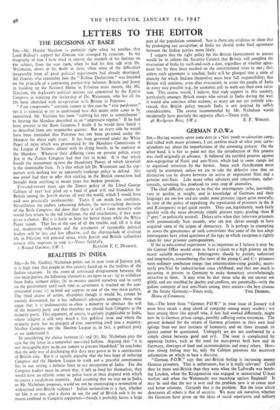GERMAN P.O.W.s
SIR,—Having recently spent some days in a Nazi youth re-education camp, and talked with many prisoners, I can confirm much of what your corre- spondents say about the imperfections of the screening process. On the other hand, it is fair to point out that the introduction of this process was itself originally an advance. It followed the justified protests against non-segregation of Nazis and anti-Nazis, which had in some camps led to organised terrorism *by the former. Some such classification must surely be attempted, unless 'we are to take the defeatist view that no distinction can be drawn between an active or impenitent Nazi and a genuine anti-Nazi. Like many other advances and concessions, unfor- tunately, screening has produced its own crop of anomalies.
The chief difficulty seems to be that the interrogators (who, inevitably, vary in quality, in insight, and in knowledge of Germans and their language) are too few and are under some pressure (again quite naturally, in view of the policy of expediting the repatriation of prisoners in the A and B categories) to get quick results. They can, legitimately, work fairly quickly with the more obviously simple peasant types, grading them B (" grey," or politically neutral). Delays arise when they interview prisoners with pronouncedly Nazi records, who are just clever enough to have acquired some of the jargon of democracy. It is perhaps in attempting to assess the genuineness of such conversions that some of the less adept interrogators have asked questions of the type to which exception is rightly taken by your prisoner correspondents.
If the re-educational experiment is as important as I believe it may be, the Control Office would seem to have a 'claim to a high priority on the scarce suitable manpower. Interrogators should be patient, unhurried and imaginative, remembering that most of the young C and C+ prisoners were ordinary combatant troops (not concentration-camp guards), neces- sarily pro-Nazi by indoctrination since childhood, and that not much is occurring at present in Germany to make democracy overwhelmingly attractive to them. It may even be that those who do not answer too glibly, and are troubled by doubts and conflicts, are potentially—with the gallant company of real anti-Nazis among their seniors—the best citizens of the future Germany.—Yours truly, Tom DRIBERG. House of Commons.


































 Previous page
Previous page